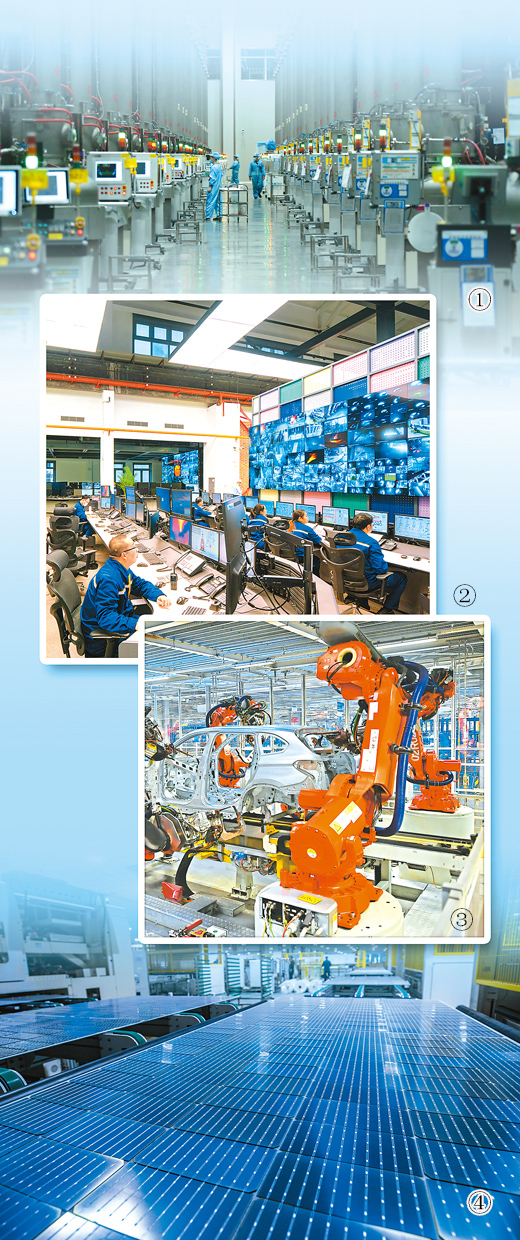Chinese regions on fast-track development of modern industrial system
Regions across China are accelerating the construction of a modern industrial system. Intelligent workshops, green factories, and zero-carbon industrial parks have commenced operations, fueling the transformation and upgrade of traditional industries.
In recent years, north China's Hebei Province has incorporated enhancing its green manufacturing system into its broader efforts to build a modern industrial sector. The province is promoting high-quality development by improving industrial energy efficiency, enhancing the capacity to utilize industrial resources, and expediting the construction of green factories, green industrial parks, and green supply chain management enterprises.
At HBIS Shisteel, a company based in Shijiazhuang, Hebei's capital, waste steel is used for steelmaking, eliminating high-emission production procedures such as coking and sintering. This approach allows the company to reduce emissions of sulfur dioxide, particulates, and other pollutants by over 75 percent.
In 2022, the Ministry of Industry and Information Technology included 19 enterprises that effectively utilize industrial solid waste on a list of businesses meeting industry standards. Following this, the province established one waste-free industrial park, 21 waste-free enterprises, and nine demonstration businesses to comprehensively utilize industrial solid waste. Last year, the added value from utilizing waste resources in Hebei grew by 23.7 percent year on year.
To advance the building of the green manufacturing system, Hebei implemented rigorous initiatives last year. These aimed to enable 265 enterprises in seven key industries, including iron and steel, coking, cement, flat glass, building ceramics, thermal power, and waste-to-energy, to achieve Grade-A environmental performance within three years.
Last year, Hebei also selected 54 energy-saving diagnostic service providers in the industrial sector to offer services to 320 industrial enterprises. It also released a catalog of recommended green and low-carbon advanced technology and equipment in key industries such as iron and steel, cement, the petrochemical sector, and chemical engineering.
To date, Hebei has recognized 411 green factories, 19 green industrial parks, 19 green supply chain management enterprises, and 56 eco-friendly products. The province aims to cultivate approximately 100 provincial-level (or above) green factories this year.

① Employees work in a silicon single crystal rod workshop of Xingtai Jinglong New Energy Co., Ltd. in Xingtai city, north China's Hebei Province. (Xinhua/Mou Yu)
②: Employees work in an intelligent production center of Baosteel Group Guangdong Shaoguan Iron and Steel Co., Ltd. in Shaoguan city, south China's Guangdong Province. (People's Daily/Zhang Mingwei)
③: Mechanical arms conduct welding work in a BMW Brilliance Automotive Ltd. workshop in Shenyang, northeast China's Liaoning Province. (Xinhua/Yang Qing)
④: A photo shows the workshop of a new energy company in Tongxin county, northwest China's Ningxia Hui Autonomous Region. (Xinhua/Yang Zhisen)
In southern China, Maoming city in Guangdong Province is developing a cluster of modern and green energy and petrochemical industries.
The city attracted an alkane resource comprehensive utilization project, backed by an investment of over 100 billion yuan ($13.9 billion) from Oriental Energy Co., Ltd., a leading alkane resources operator. Leveraging this project, Oriental Energy pioneered the construction of a zero-carbon industrial park that spans 101 square kilometers, the first of its kind in the city.
Chen Wenxin, secretary of the board of Oriental Energy, stated that a high-temperature gas-cooled reactor, co-developed independently by China National Nuclear Corporation and Tsinghua University, could ensure a clean supply of steam, electricity, refrigeration, and even hydrogen for the entire industrial park.
Upon completion, the project, which is divided into three phases, is expected to stimulate the growth of over 1,000 downstream industries. Furthermore, it aims to achieve pollution-free production and zero carbon emissions throughout the entire chain, from chemical production to energy use.
With the establishment of the zero-carbon industrial park, Maoming is building a modern industrial system across the board by focusing on the strategic needs of green chemicals, new materials and new energy, said Zhuang Yuequn, secretary of the Communist Party of China Maoming Municipal Committee.
Guangdong aims to develop a modern energy system that is clean, low-carbon, safe, efficient, intelligent, and innovative. The province strives to ensure that energy consumption per unit of the province's GDP, as well as energy consumption per unit of added value of industrial enterprises above the designated size (with an annual business turnover of at least 20 million yuan), decrease by 14 percent by 2025, compared with 2020.
Northeast China's Liaoning Province has shifted its manufacturing sector towards more high-end, intelligent, and environmentally friendly production methods over recent years.
"So far, Liaoning has recognized 287 state-level small- and medium-sized enterprises that apply special, sophisticated techniques to produce unique and novel products, as well as 524 provincial-level ones," said Chen Hu, deputy director of the Industry and Information Technology Department of Liaoning Province. He also added that the added value of high-tech manufacturing in the province increased by 14.9 percent in the first quarter of this year, and investment in industrial and technical upgrading surged by 25.5 percent.
Liaoning has placed a priority on intelligent manufacturing, leveraging digital technology to facilitate the transformation and upgrading of traditional industries. At present, the province has built 152 digital workshops and smart factories, and implemented 1,235 application scenarios. The rate of numerical control for key processes and the penetration rate of digital transformation tools for R&D and design in key industrial enterprises have reached 59.7 percent and 77.2 percent, respectively.
"This year, Liaoning plans to build over 60 smart factories and digital workshops, and cultivate 10 exemplary enterprises in digital transformation," Chen Hu said.
As Liaoning accelerates its industrial structure adjustment and advances its digital transformation, it has achieved breakthroughs in fostering the green and low-carbon development of the manufacturing sector.
Statistics indicate that the energy consumption of industrial enterprises above the designated size in Liaoning dropped by 4.1 percent year on year in 2022.
Photos
Related Stories
Copyright © 2023 People's Daily Online. All Rights Reserved.









